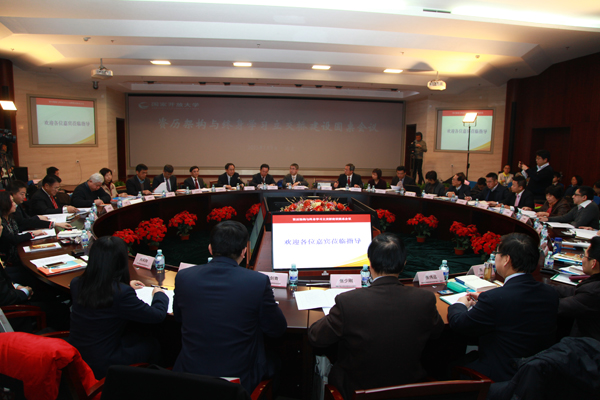 In order to share and exchange experiences in building an overpass to lifelong learning between China's mainland and Hong Kong, a round-table conference on Qualifications Framework and lifelong learning overpass construction was held in Beijing on January 9. The conference was jointly organized by the Open University of China (OUC), the Qualifications Framework Secretariat (QFS), the Centre for Research in Continuing Education and Lifelong Learning, School of Professional and Continuing Education,the University of Hong Kong (HKU SPACE). The participants of the conference exchanged their experiences in carrying out Qualifications Framework and construction of the overpass to lifelong learning.
In order to share and exchange experiences in building an overpass to lifelong learning between China's mainland and Hong Kong, a round-table conference on Qualifications Framework and lifelong learning overpass construction was held in Beijing on January 9. The conference was jointly organized by the Open University of China (OUC), the Qualifications Framework Secretariat (QFS), the Centre for Research in Continuing Education and Lifelong Learning, School of Professional and Continuing Education,the University of Hong Kong (HKU SPACE). The participants of the conference exchanged their experiences in carrying out Qualifications Framework and construction of the overpass to lifelong learning.

Liu Jiantong, Deputy Director of the Department of Vocational and Adult Education, Ministry of Education (MOE), and Lu Shixiong, Deputy Secretary-General of the Education Bureau (EdB), attended the conference. Cen Jianjun, Director of the Department of International Cooperation and Exchange (Office of Hong Kong, Macao and Taiwan Affairs) spoke about educational exchanges between Hong Kong and the mainland. He said that in recent years, universities and colleges have strengthened their cooperation and the number of student exchanges is on the rise. Enrollment, cooperation in school management, and coverage in education degree level are all also seeing an upward trend. The number of Hong Kong students visiting the mainland is increasing year on year. Cen Jianjun pointed out that Hong Kong created a Qualifications Framework before mainland China and thus has rich experience in this regard. The OUC should actively learn from Hong Kong in building a Credit Bank and an overpass to lifelong learning.
Lu Shixiong introduced Hong Kong’s experience in building a Qualifications Framework. The Qualifications Framework was officially launched in May 2008. It aims to help Hong Kong people set clear goals and directions for continuous learning in order to obtain quality-assured qualifications. In the long run, it will help enhance the overall quality and competitiveness of the local workforce. Hong Kong’s Qualifications Framework is a seven-level hierarchy of qualifications covering the academic, vocational and continuing education sectors. As of May 2014, approximately 7,450 qualifications granted by 227 qualified training institutions have been registered with quality assurance mechanisms and qualifications.
Liu Jiantong introduced the background and process of Credit Bank and lifelong learning "overpass" construction in mainland China. According to the National Outline for Medium and Long-term Education Reform and Development, it is necessary to carry out pilot projects to build institutional mechanisms for lifelong education and establish a credit accumulation and transfer system for continuing education, build a accreditation system for learning outcomes, and establish a "Credit Bank" system. In 2012, the MOE formally approved the OUC’s project to carry out "research and practice into a national continuing education learning outcomes accreditation, accumulation and transfer system", and conducting comprehensive exploration and practice into the national "Credit Bank" system. After two years of research and exploration, the project has achieved some results. He hopes to learn from Hong Kong’s experience in establishing a Qualifications Framework for the next stage and promote Credit Bank practice in mainland China.
More than 100 experts and representatives from Qualification Framework Secretariat, universities and colleges, and relevant industry and business sectors of Hong Kong and relevant personnel from ministries, industries, enterprises, and universities in mainland China participated in the round-table conference.
After two years of study and practice of exploration, the “research and practice into a national continuing education learning outcomes accreditation, accumulation and transfer system" project has built a model that takes a learning outcome framework as the core, clarified the technology necessary to combine framework and standards, and formed a system architecture with the framework and standards of learning outcomes as its core, a learning outcomes accreditation service system and information platform as its basis of operational support, and with policies and regulations, and quality control and funds as its guarantee. Validation practice has been conducted in the development of a learning outcomes framework, the development and application of accreditation standards, the construction of a accreditation service system, and the construction of an information platform. A preliminary national Credit Bank system is taking shape.
In addition, in December 2014, the OUC was approved by the MOE Department of Vocational and Adult Education to serve as a pilot for the accreditation, accumulation and transfer of continuing education learning outcomes. The main tasks for the pilot include the following: the OUC should form a framework for the learning outcomes of continuing education with RTVUs nationwide; establish accreditation standards for learning outcomes in various sectors; build an alliance for mutual recognition of learning outcomes; build a Credit Bank information management platform and accreditation service system, so as to explore the accreditation, accumulation and transfer of different types of learning outcomes.
By Jin Hongyu